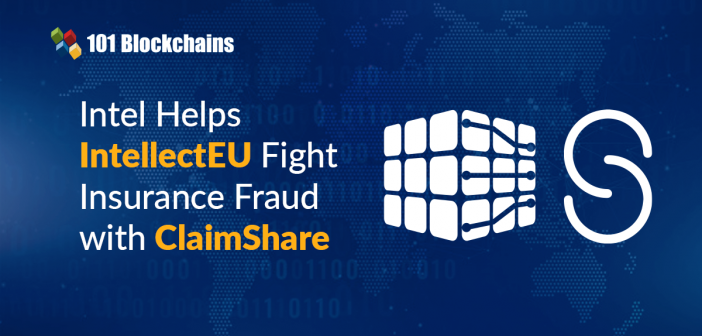Learn how blockchain truly works, master key definitions, and uncover what makes smart contracts so "smart." Dive into the fundamentals, gain valuable insights, and start your blockchain journey today!

News & Updates
101 Blockchains
on March 18, 2021
IntellectEU’s ClaimShare Helps Fight Insurance Fraud
Insurance fraud has found a new nemesis with IntellectEU launching its latest initiative. As a technology enterprise dedicated to emerging technologies, insurance tech, and digital finance, it has secured insurance fraud detection. Now, users can get improved security with IntellectEU’s ClaimShare, a new insurance fraud detection portal. The technology company has deployed Intel SGX or Software Guard Extensions for achieving this unique feat.
IntellectEU’s ClaimShare leverages the capabilities of the confidential computing platform of R3, Conclave, which capitalizes on Intel SGX. R3 Conclave is deployed on Microsoft Azure, one of the leading cloud computing platforms in the existing market. In addition, ClaimShare also uses artificial intelligence and the Corda blockchain for solving a continuously aggravating problem of the insurance industry, i.e., fraudulent duplicate insurance claims.
The Director of Confidential Computing at Intel, Michael Reed, said that “The implementation of Intel SGX technology in combination with confidential computing can help in combating insurance fraud. This new initiative will serve as a game-changer for insurance companies in fighting against emerging forms of insurance fraud”.
He also added, “The insurance industry highly depends on strict data privacy and GDPR (General Data Protection Regulation) compliance. New and innovative solutions such as ClaimShare would foster communication, collaboration and better levels of privacy”.
Read Now: How to Become a Corda Expert
How does ClaimShare Help Fight Insurance Fraud?
The existing state of the insurance industry speaks a lot about the need for a new solution to fight insurance fraud. The Federal Bureau of Investigation (FBI) estimates the overall cost of non-health insurance fraud at over $40 billion annually. So, the average family in the US has to bear the burden of increased premiums annually in the range of $400 to $700 due to insurance fraud.
In addition, insurance companies also invest consistently in fraud-prevention technologies for identifying patterns of fraudulent insurance claims and transactions. However, such fraud-prevention technologies are generally restricted to internal data. Furthermore, the lack of collaboration worsens the situation with various malicious agents creating multiple claims for similar loss events with multiple insurers.
Such type of insurance fraud with duplicate claims is referred to as ‘double-dipping.’ Basically, a single claimant could get insurance claims from multiple insurers for the same incident through double-dipping. According to the estimates of KPMG, double-dipping frauds account for around 5% to 10% of payouts by insurers. It is difficult to fight insurance fraud such as double-dipping as insurers usually don’t know that other insurers have already paid out the claimant for similar claims.
The new innovative solution by IntellectEU is a revolutionary initiative for addressing the issue of double-dipping. The industry-wide platform of ClaimShare ensures secure data sharing across insurers with the power of Intel SGX and confidential computing. The most important element under question when sharing sensitive insurance information of people refers to confidentiality. Insurers must comply with various privacy and regulatory limitations to ensure confidentiality.
According to the Director of ClaimShare, Chaim Finizola, it is the first industry-wide platform for addressing emerging fraudulent challenges in the insurance industry. At the same time, it also provides the desired levels of client and business privacy. He also said, “This is one of the first technologies to support such a secure approach for data exchange”.
Highlights of the New Solution by Intel Intellect
The recent advancements alongside the rising adoption of confidential computing and enterprise blockchain have offered promising options for insurers to share and match data with better security and privacy. Mr. Finizola considers this new industry-wide platform as the best available solution to fight insurance fraud head-on.
The next important concern associated with ClaimShare directly refers to its working. It provides oversimplification of the process, thereby enabling multiple insurers to share encrypted claim data by leveraging Conclave. The role of Conclave, in this case, is evident in the use of secure hardware for serving a black box. Nobody could see what is inside Conclave, but it runs code with capabilities for comparing claims among insurers.
Conclave could verify whether similar claims have been raised for the same house or car. In the event of multiple claims for the same incident, it would automatically trigger a warning for a fraud claim. Subsequently, the second insurer would receive notification before paying out the concerned claim. At the same time, the first insurer can report the insurance fraud attempted by claimant without knowing the identity of other insurers.
Matching personal information by leveraging confidential computing also ensures that ClaimShare is GDPR compliant. However, matching personal information is the last step in the event of a suspicious claim. Prior to the use of Conclave, it shares non-personal information by leveraging Corda blockchain. It also uses AI for flagging suspicious claims before bringing in confidential computing for confirming the fraudulent nature of claims.
For example, in the case of a car crash, the solution would compare the make and color of the car. It would also verify the location and time of the incident on the blockchain. In the case of a suspicious claim, it can provide confirmation for the fraud by leveraging the date of birth of the policyholder.
ClaimShare distinguishes claims data into non-personally identifiable information (non-PII) and personally identifiable information (PII). It uses fuzzy matching algorithms for identifying suspicious claims. The facility of duplicate fraud claim verification throughout insurers ensures a notable reduction in payouts for fraudulent claims with better collaboration. Therefore, insurers can place public claims data on ClaimShare’s ledger followed by verification. The public claims data helps considerably in checking whether a claim has already been paid out.
The most striking highlight of the new solution of IntellectEU for fighting insurance fraud is Intel SGX. It leverages a hardware-based execution environment with improved trust. The execution environment also serves as an enclave or an area of memory, offering better levels of security safeguards. As a result, it can support the isolation and protection of particular application codes and data in memory.
With the help of a confidential computing environment powered by Intel SGX, ClaimShare could foster security in sharing encrypted data and collaboration among insurers. It can also ensure privacy without concerns for leaking any competitive or sensitive information. The pilot test for the insurance fraud detection solution has been focused on auto insurance only. However, it will soon find applications across other insurance products.
According to the Head of Forensic at KPMG in Belgium, Kami Zargar, double-dipping is a prominent insurance industry concern. It contributes to the majority of frauds throughout the industry. At the same time, systematic detection of insurance fraud has been unviable due to data and technological restrictions.
The new insurance fraud solution by IntellectEU could improve cost savings throughout the insurance sector. Also, it can also boost the levels of trust in the insurance sector while reducing household insurance costs.
Also Read: Corda Use Cases
Blockchain and ClaimShare
Blockchain plays an important role in ClaimShare by offering the DLT layer to ensure scalability, privacy, performance alongside other features. DLT layer can offer scalability required for performing pre-validation for data alongside filtering the data according to different types. In certain cases, data could not be shared throughout jurisdictions, and Corda serves as the ideal solution.
Interestingly, the insurance fraud detection solution has achieved the B3i and R3 Insurtech Global Challenge. The contribution of KPMG in the form of business and industry insights can also deliver comprehensive fraud detection capabilities. Furthermore, KPMG is also driving better levels of legal compliance according to specific jurisdictions and introducing the solution in the market.




